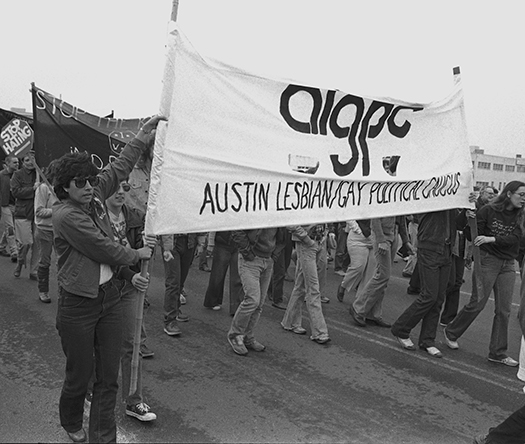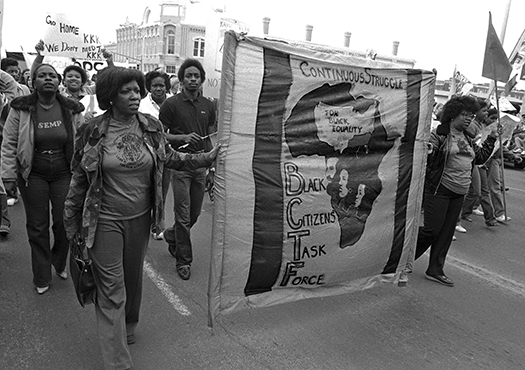Police brutalized protesters, then and now.

Austin Lesian/Gay Political Caucus at July 1983 march against the KKK.
Photo by Alan Pogue / The Rag Blog.
This article was first posted at La Voz de Esperanza and was cross-posted to The Rag Blog by the author.
AUSTIN — A body — as strong as it can be — is supremely delicate. The skin covering the skull splits easily; a police baton swung at the right angle, with the right force, parts the flesh precisely.
In February of 1983, the KKK decided to take back Texas. They held one event per month including a cross burning on land adjacent to a Black family. They rallied against Black History Month at the state capitol; the historical society displays photos of its construction by Black “prisoners” that docents consider a must-see for thousands of children on field trips. The capitol crowns Congress Avenue which also happened to be the gentry’s preferred location for holding a lynching back in the day.
There was no way I could stay home as the K
marched in my hometown.
There was no way I could stay home as the K marched in my hometown. Texas’ long history of cloaking white supremacy under the banner of “law and order” includes the Texas Rangers, or pinches rinches, who expanded the King family’s control of South Texas through extrajudicial murders and displacement of Mexican and First Nations landowners. The spirit of 12-year-old Santos Rodriguez — murdered by Dallas police as they tried to scare him into confessing for a burglary he didn’t commit would have haunted my friends and me, had we not protested.
I met Jesse Johnson, Ramón Hernandez, Mary Sue Galindo, and Julie Garza at UT where we plotted our revolution while smoking mota outside the Texas Union. The day of the rally we met at Julie’s place on the East Side for a smoke and breakts, who were with the Black Citizens Task Force, and feeling righteous in our cause.
I remember standing by Velma Turner and Dorothy Roberts who were with the Black Citizens Task Force and feeling righteous in our cause. I remember the police pointing at those of us who’d protested against police brutality. I remember how a provocateur looking to pick a fight shoved me as Adela and I stood between them and Paul, the hot-headed leader of the Brown Berets. I remember panicking when I got separated from Jesse, Ramon, Mary Sue, and Julie. I remember someone passing me a gun telling me to hold onto it. I remember the yelling. I remember the crush of bodies running to chase the Klan out of town. I remember the hate.
I remember the wave of protesters pushing me
into the line of cops.
I remember the wave of protesters pushing me into the line of cops in riot gear. I remember their rage as they yelled at us to get back. I remember screaming at them we couldn’t because people behind us were running downhill. I remember Paul yelling that it was a free country and that we could cross the street if we wanted. I remember the shock. I remember throwing my arms up to protect my head. I remember the gray sweatshirt that I had to cut off of me because my arm swelled to the size of a football. I remember the terror seizing my diaphragm, squeezing the air out of my lungs. I remember feeling like I couldn’t breathe.
I remember a cop yelling at me to “just drop to the ground,” I remember thinking he wanted the beating to stop. I remember the pavement. I remember the dizziness. I remember screaming for Adela who went down with one hit. I remember my indignation. I remember yelling “You’re going to kill him!” as eight officers beat Paul, who weighted 125 pounds. I remember an officer yanking me out of the way. I remember people helping me to the curb. I remember the blood pooling at my feet. I remember Ramón dropping to his knees beside me. I remember his green canvas medic bag. I remember being grateful that we’d helped him graduate from nursing school by writing his papers for him. I remember wanting to laugh. I remember his tenderness as he wrapped my wound.

Dorothy Turner, left, holds Black Citizens Task Force Banner at anti-KKK rally in Austin, July 1983. Photo by Alan Pogue / The Rag Blog.
I remember going limp with relief when Jesse, Mary Sue, and Julie found me. I remember screaming at the governor who had come into the ER to check on wounded officers. I remember laughing when the X-ray technician asked if I had a gun in my pocket and was able to show him it was just film. I remember laying on Julie’s waterbed that night as the fundraiser for the Venceremos Brigade went on as planned in the living room. I remember people coming into the dark room to check on me. I remember Yvonne had to leave because she was crying so hard.
I remember the Berets giving me props. I remember being furious because it wasn’t until I’d been bloodied in a beating that they recognized my work. I remember Ramón, Jesse, Mary Sue, and Julie running into the bedroom squealing because Ntozake Shange had arrived. I remember them making me get up to go see. I remember how everything hurt. I remember the fog. I remember Ntozake’s beauty. I remember taking deep breaths as I lay back down in that little house on the East Side with Jesse, Ramón, Mary Sue, and Julie sitting on the bed.
I was safe.
I could breathe.
A news videographer captured the beatings.
A news videographer captured the beatings. The footage was damning. The police panicked and launched an “investigation” to craft a justification for their action. I refused to speak to them. They staked out my apartment for several days. I parked my car a few blocks away and walked home the back way. They terrorized my mother who’d flown in from El Paso when she wouldn’t tell them where I was.
Amá and I had the worst fight. “Me estás matando!” she hollered when I said I wouldn’t go back to live in El Paso. “Lleva años diciendo que estoy matando y no se ha muerto!” I yelled back. I’m not proud of the hell I put her through. She went to every protest and stood by me wanting to rip the throat out of the cops that had hurt her baby.
The mayor called us hoodlums so often that years later I met people who were surprised I wasn’t the deranged, violent person the mayor and cops made me out to be. Adela, Paul, and I were charged and arrested three weeks later. The jail workers were sympathetic and didn’t cage us. Tom Kolker and Malcolm Greenstein with the National Lawyers Guild stepped in to represent us. They were fired by the Beret’s leadership in what I now know to be an act of bald-faced anti-Semitism.
Mr. and Mrs. Aguallo insisted I stop by their flower shop once a week to give me a giant bunch of flowers; this went on for months. Las Manilas fed me for free for a long time. I couldn’t feel calm until I crossed the bridge into my East Side neighborhood — 02 p/v [78702 forever]. Jesse and I moved in with Ramón just down the street from Julie’s place. His apartment was tiny; the three of us slept on his king size waterbed together.
I could breathe.
The city hired an expensive legal team to
prosecute the case.
The city hired an expensive legal team to prosecute the case against us. Adela and I were acquitted. We tried to sue, but the city had way more money than we did. The police who beat us got paid time off “to deal with the trauma they’d experienced.” I grew quieter in spite of my efforts to be the revolutionary hocicona, malhablada, lesbianota I knew I was meant to be.
Ten years after that beating, I was preparing to address a group protesting yet another Klan march at the capitol. Dottie Curry offered to help me think; I didn’t know what to say. I tried to articulate the lesson I was supposed to take from that experience. Dottie told me to stop. “You didn’t learn anything you didn’t already know. You already knew police violence exists. You already knew it was wrong. Period.”
As awful as that experience was, I know it would have been worse if I were Black. I only felt like I couldn’t breathe. I wasn’t in a chokehold.
A formerly incarcerated Chicano now working on prison abolition once said, “Chicanos are becoming the new white pipo; it’s Chicano cops shooting at Blacks.” I know he’s right.
I trace the scar along my scalp absentmindedly a few times a day. I’ve turned it into a reminder of a few good things. If Dottie were still around, I’d argue that I had indeed learned something that day — about love, solidarity, and gratitude.
Ramon died of AIDS. Heart disease took Julie before her time. Cancer got Dottie. Racism cut Velma and Dorothy’s lives short. My mom made my siblings promise to take care of me on her deathbed. They all come along with me to the vigils and protests. When I feel like I can’t breathe, I remind myself that it’s only a feeling, and I take a big-ass deep breath.
I’ll see you on the streets.
Ni Una/o Mas
Mi Lucha es tu Lucha
Black Lives Matter
[María Limón, a native of El Paso, has worked with the LBTQ Family Violence and Latinx communities in Austin. She currently works at the University of Colorado in Denver for the Center for Domestic Violence.]


















María tells this so powerfully, letting history resonate in the present. It’s not so long ago that the KKK marched in Austin. A community turned out in protest, with Black and Latinx organizations leading the way. The Black Citizen’s Task Force, the Brown Berets, and the Austin Lesbian/Gay Political Caucus (ALGPC) opened doors for today’s resistance.
Many of you now know, Paul Hernandez passed away this last weekend. He was brutally beaten in the anti-KKK march that María has written about. I spoke with him at a rally against the Trump wall in 2017. He was there with other Brown Berets. He said: “We didn’t cross the border. It crossed us.”
Texas history classes didn’t teach us that Mexico had abolished slavery and many fighting for Texas independence didn’t intend to abide by that law. We didn’t hear that there was an underground railroad to Mexico for slaves. Steve Rossignol has posted about that for The Rag Blog. We have a lot to learn and still a lot to un-learn as we go forward.
Thank you, Paul, for your leadership. Rest in Power!
Paul was a great guy and absolutely fearless. This article is one of the best To run on The Rag Blog and demands much wider circulation.
Thanks Maria for writing this article. I miss seeing you and my days at ASA and ALLGO. Thank you for keeping our history alive. I wish I had know what was going on better when this was happening. I still protest at the Capitol when I am able. You are missed.